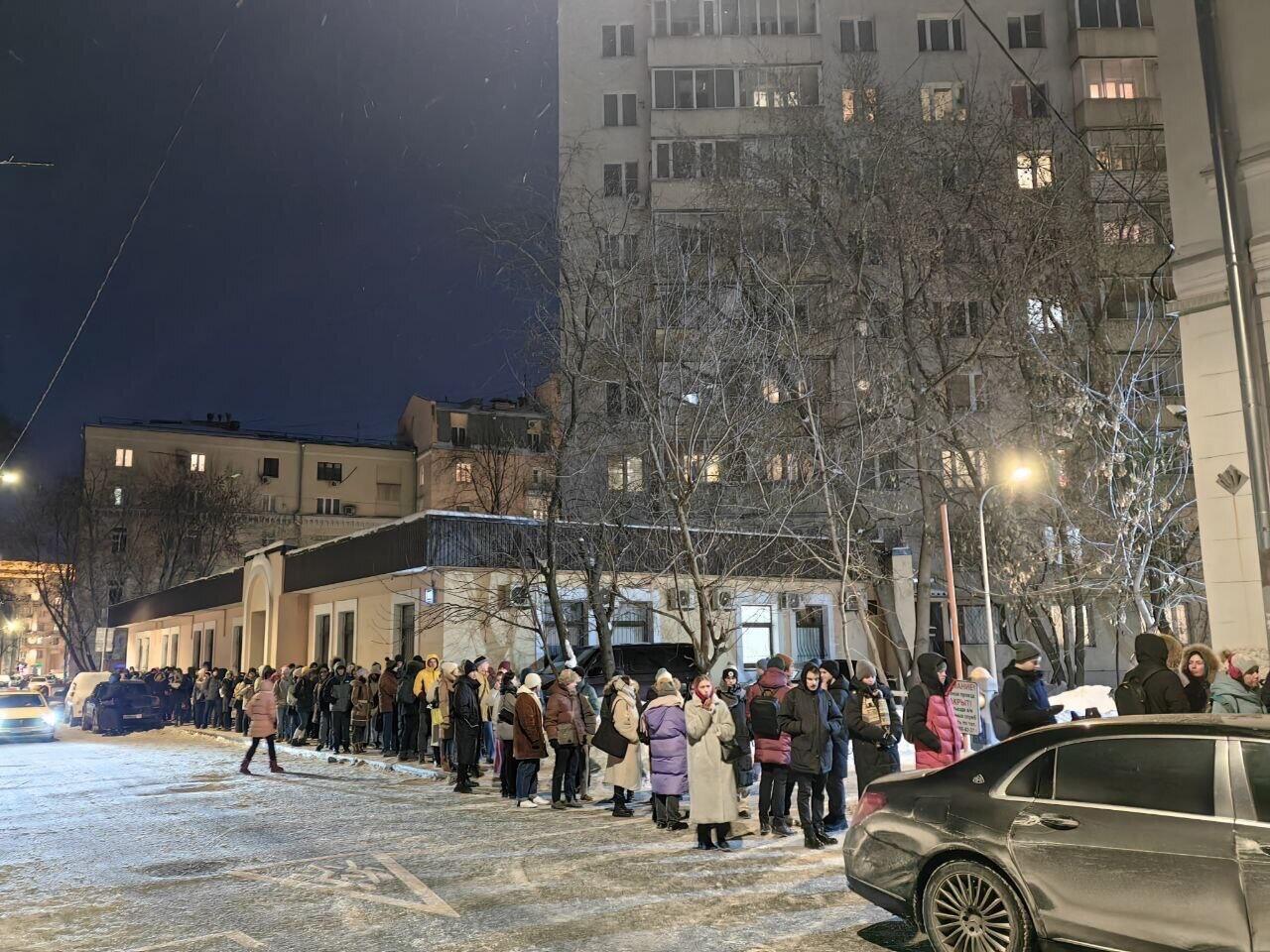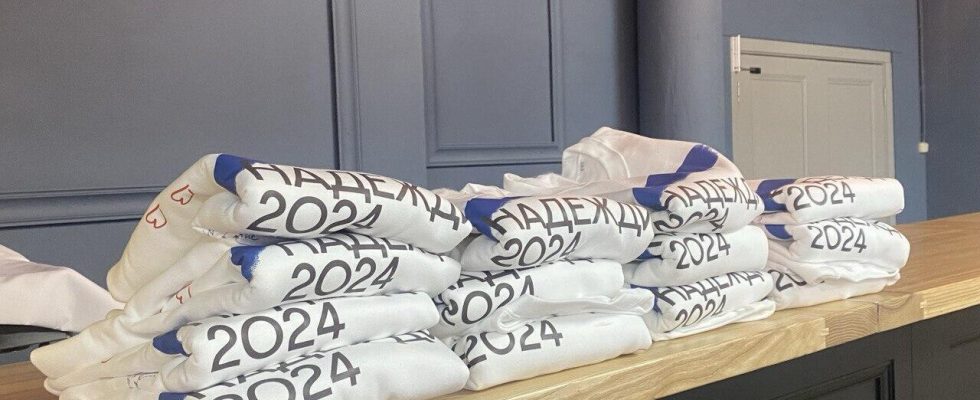There are 48 hours left in Russia for the deadline for submitting signatures for a candidacy for the presidential election in mid-March. A vote whose outcome, even more than usual, does not really raise any doubts. In recent days, however, in a country that is increasingly locked down every day, a phenomenon is surprising: that of queues to sign for Boris Nadejdine. He is the only candidate authorized to collect signatures to openly oppose what Vladimir Putin persists in calling a “special operation”. This former elected official, who has been in the liberal opposition but also in movements more in line with the authorities, held a press conference this Sunday, January 28, in Moscow.
6 mins
From our correspondent in Moscow,
At first glance, a very classic political meeting took place this Sunday in the Russian capital. An overwhelmed press officer, activists already dressed in the first campaign sweatshirts, bodyguards on the lookout and a candidate, an old hand in politics, very comfortable at the microphone, answering questions from the audience , predominantly young and male, typically the age group of those mobilized, on various subjects: abortion, balance of powers, glaring underinvestment in public infrastructure, pollution. This without evading what, he knows, has earned him this surprising enthusiasm: his unequivocal condemnation, from the start, of what he takes great care to call “ a special operation “, ” a fatal mistake by Vladimir Putin “, he repeated again, who “ shattered any possibility of connection with Ukrainians for decades to come “.
Except that the mere fact of holding this rhetorical exercise in Russia today seems to be a cautious balancing act. The invitation to the event fell on Saturday evening, the accreditation and the address were communicated during the night from Saturday to Sunday, barely a few hours before the meeting, finally nothing from the outside indicated the place meeting, discreet, in a building inside a courtyard in the center of Moscow.
The presence, at this stage of the competition, of this candidate raises questions
A candidate embodying the opposition to give a veneer of legitimacy to this election that everyone in Russia knows is a foregone conclusion, the configuration is known. But this time, with figures behind bars like Alexei Navalny or Ilya Iachine, the vast majority of independent media based outside the country and classified “ foreign agents ” Or ” unwanted », the military censorship at work since the start of the war, the wave of exile of ordinary Russians, the presence at this stage of the competition of this candidate raises questions.
Ekaterina Duntsova, an independent journalist, was thus excluded at the preliminary stage by the electoral commission in December, on the classic grounds, “ administrative irregularities “. As for the other 11 potential candidates, they are attacking legitimism. At the question : ” are you here to win? “, one of them responded a few days ago: ” of course not, do I look like an idiot? “.
Having just been nominated as a candidate at the end of December by his party, the nationalist and Kremlin loyalist Leonid Slutsky assured him from the outset that he “ will not take away your voice » to Vladimir Putin whose victory will be “ huge“, he promised.
“ Unfortunately, if I understand correctly, the president does not watch YouTube or Telegram »
The steamroller of repression continues its work. Just last week, for example, we learned of the first conviction of a Russian woman for having given a comment to a media classified as “undesirable . “. Boris Nadejdine admitted to RFI that he had some difficulties collecting signatures in certain regions such as Chechnya, but he has already far exceeded the threshold of 100,000 signatures required. He can also, for example, underline without almost seeming to touch a sensitive point such as the age of the president-candidate (71 years) and his disconnection with the country by asserting this Sunday afternoon, in the face of a hundred people recording and filming: “ When someone has been in power for so long, the main problem is that they stop understanding what’s going on. Because she receives information in the form of notes from her departments. Unfortunately, if I understand correctly, the president does not watch YouTube or Telegram ».
Alibi or not, Boris Nadejdine is already dealing with the red lines of power
The debate on the interest of supporting a “liberal” candidate who would be present with the more or less tacit consent of the Kremlin is recurrent at each Russian presidential election within the opposition. But this year, many of these figures in exile have already decided: Mikhail Khodorkovsky or those close to Navalny judged that it was necessary to call for a signature for this 60-year-old political veteran. Others already see fragility in this support. Because in today’s Russia, they are more than enough to present Boris Nadezhdine as the candidate of a hated West and lead him into a dangerous zone for his security and that of his supporters, well beyond a campaign of denigration.

Alibi or not, Boris Nadejdine is already dealing with the red lines of power. To RFI’s question: “ will you campaign in the regions of Donetsk, Luhansk, Zaporizhzhia e t Kherson [les régions sous le contrôle partiel de l’armée russe et qui ont été annexées en septembre 2022, NDLR] ? “,he therefore responded in the negative. Except that the reason given is not that he contests the legitimacy of a campaign and a vote on the occupied territory of Ukraine, but because he considers it impossible, “due to fighting and martial law“.
The independent journalist in exile Farida Roustamova noted on January 23 that“People who support Boris Nadezhdine are unlikely to have any illusions about both his personality and his chances in the elections. This is just a fight for the opportunity to choose an “anti-war” ballot. […] “But it is also unlikely that government officials expected that their political operation would not go as planned and provoke such a reaction among anti-war Russians.”
Boris Nadejdine will submit his signatures on January 31. The electoral commission has a maximum of ten days to validate them. If he can compete, he will also be able to have his own observers during the vote.
Read alsoPresidential election in Russia: signatures for Boris Nadejdine, gesture of anti-war protest
